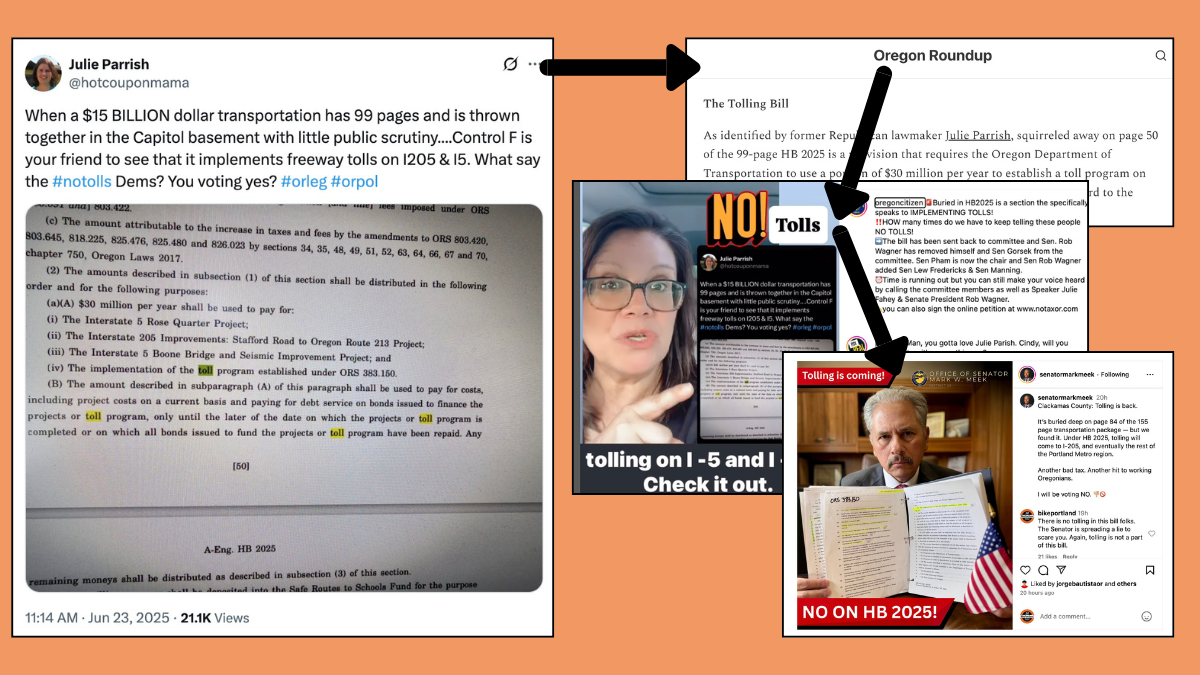
In their quest to derail a transportation bill, lawmakers who opposed House Bill 2025 misled voters and colleagues by spreading falsehoods that backed up their ideological positions.
Senate Democrat Mark Meek and House Republican Shelly Boshart Davis have used their positions of influence to spread untruths. These falsehoods were read by tens of thousands of Oregonians, several lawmakers, and they poisoned the well of an already tense debate about how best to fund Oregon’s transportation system.
Senator Meek, a Democrat who represents Gladstone, Happy Valley, and Oregon City, posted on social media Thursday that HB 2025 would bring tolling to I-205 and “the rest of the Portland region.” The post included a photo of a serious-faced Meek holding open a binder with a printed copy of the bill with some highlighted text. “Tolling is back,” Meek warned. And to make it seem like a nefarious plot he heroically uncovered, Meek told his followers, “It’s buried deep… but we found it.”
The post struck me as odd because HB 2025 did not include tolling — and Meek should have known because he was a member of the committee where it was discussed.
There are numerous ways to prove the bill was toll-free.
In legislative bills, only boldfaced text is new language. None of the passages Meek highlighted, and none of the mentions of tolls in the bill, are boldfaced. The passages Meek pointed to were from the existing transportation bill passed in 2017. When lawmakers author a new bill, they often copy/paste large passages of the existing law because it’s still valid and/or the new language needs to reference it. And finally, none of the official analysis of the bill on the Oregon Legislative Information Service (OLIS) website mentions tolling.
Perhaps the biggest piece of evidence that the tolling claim is untrue is that it was never (as far as I can tell) amplified by Rep. Boshart Davis. As a major critic of tolls and a vice-chair of the Joint Committee on Transportation Reinvestment where HB 2025 was debated, if the bill included tolls, Boshart Davis would have talked about it at every opportunity. She never mentioned tolls on social media, or in statements, and uttered not one word about them during months of committee meetings.
Despite it being a falsehood, Meek’s social media post was widely circulated. On X (Formerly Twitter), his post was reposted by local sports reporter Dwight Jaynes (14,200 followers), Oregon House Rep. Ed Diehl (7,000 followers) and the official account of the Oregon Republican Party (12,000 followers), among others.
Senator Meek likely didn’t come up with this idea himself, and given how it spread it seems more like a disinformation campaign than an innocent mistake. The tolling untruth sprung to life three days before Meek’s post when Julie Parrish shared it on X (formerly Twitter). Parrish is a former Republican lawmaker who served in the Oregon House of Representatives from 2011 to 2018. That legislative experience didn’t prevent her from posting the false claim that HB 2025 “implements freeway tolls on I-205 and I-5.” Her post has 21,300 views so far and despite it being clearly untrue, she’s doubled-down on the claim, has not deleted her post, and has not issued a correction (so far no one who spread this untruth has deleted or corrected their post(s)).
Parrish’s post was seen by Jeff Eager who writes Oregon Roundup, a website and newsletter that covers, “Oregon’s dysfunctional state government and the politics that create it.” One day later, on June 24th, Eager amplified Parrish’s post in a story about the bill (under a section titled, “The Tolling Bill”) and boasted that he was the first person to report the news.
Parrish’s post was also picked up by another conservative-aligned outlet called Oregon Citizen. An Instagram video on that account claiming that “buried in [HB] 2025 is language to implement tolls on I-5 and I-205” has been viewed over 20,000 times and has been liked by over 1,000 people. The video was cross-posted by PDX Real, one of the largest outlets in Oregon’s burgeoning, online, conservative-aligned media ecosystem. (PDX Real is playing all sides on this issue. They posted Oregon Citizen’s video to their account, then two days later left a comment on Sen. Meek’s post saying it is “not accurate” and that he should issue a correction. Meanwhile, the video remains on PDX Real’s page without a correction. On Friday, in a comment on a video I made, PDX Real attempted to excuse Meek’s post as a simple mistake.)
I can safely estimate this false claim about tolling in HB 2025 was seen by nearly 100,000 online accounts. It was widespread enough to be noticed by at least one mainstream media outlet, the Governor of Oregon, and the chair of the Joint Committee on Transportation Reinvestment.
Unfortunately when Oregon Public Broadcast covered Meek’s post, they never pointed out that it was untrue. They merely said it was a claim made by Meek and that “Democrats rushed to refute the claim.” This treatment makes the casual reader think both sides simply have a difference of opinion — when in reality one side is spreading false information.
At the outset of the final HB 2025 committee hearing on Friday, one week after Meek had been removed from the committee by Senate President Rob Wagner, Co-Chair Khanh Pham addressed Meek’s post. Unfortunately she called it a “rumor,” never mentioned Meek or anyone else in the disinformation campaign by name, and she didn’t explain how it might have impacted discourse around the bill. A letter from Governor Tina Kotek read by committee Co-Chair Susan McLain refuted the tolling claim, but lacked the clarity and directness the issue deserves.
This is just one example of how disinformation impacts Oregon’s transportation politics.

On Friday, after the session ended, we saw another example. This time it was from Rep. Boshart Davis, a leader in the Republican party and key voice against HB 2025 who’s also vice-chair Joint Committee on Transportation Reinvestment.
In an official statement about the bill, Boshart Davis said its passage would have led to “Economic harm across sectors.” To prove her case she shared four data points pulled from an unnamed report. The bill, she claimed, would have led to: 16,392 fewer jobs, a $2.5 billion decrease in Oregon’s GDP, a $1.7 billion personal income decline, and a $4.2 billion drop in business sales.
That is a damning critique of HB 2025; but it’s not true.
The numbers come from a report by Common Sense Institute of Oregon (CSI), a nonprofit think tank with many ties to conservative politicians and causes. Oregon House Republican Leader Christine Drazan was a founding board member. However, even with the partisan leanings of its source, I’m willing to give the report the benefit of the doubt because some of its authors are serious economists (including Oregon’s former state economist, Mark McMullen).
CSI crunched the numbers of the two versions of HB 2025 that were adopted out of committee last week: the initial $14.6 billion version (HB 2025 A) and the trimmed down, $11.6 billion version (HB 2025 B). Boshart Davis chose to use numbers from the larger, outdated version of the bill. She also chose to use numbers from just one side of the economic impact equation: the tax revenue side.
Yes, as Republicans made quite clear, HB 2025 included numerous new taxes. But it also included a considerable amount of new spending. In their report, CSI analyzed impacts of both the tax revenue and spending elements of the bill to come up with an “on net” impact. According to CSI, HB 2025 A would have led to: 5,094 new jobs, a $1.1 billion GDP increase, a $635 million increase in personal income, and a $1.8 boost to business sales.
By using just one side of the data, Boshart Davis misrepresented the impacts of the bill in a way that aligns with the idealogical position of her and her followers. Similar to the impact of the tolling untruth spread by Meek, Boshart Davis’ choice to share misleading data shows how high-profile voices and their allies in ideologically-aligned media outlets can put their thumbs on the scale and foment anger, fear, and opposition — it’s a formula that’s been perfected by the national Republican party.
Then, after peppering the debate with false information amplified in friendly media bubbles where facts matter less than clicks and influence, these leaders of the opposition then pointed to all the Oregonians who agree with them. “Just since this amendment was posted yesterday,” Boshart Davis said in the final committee hearing on HB 2025 held Friday, “Over 4,000 people have submitted testimony. Of that, 70% are opposed.” “ODOT wants to add tolls to their open ended funding… The tolling proposal… is simply absurd,” wrote Oregonian Dean Suhr in one of many written pieces of testimony that referred to the non-existent tolling plan.
And speaking from Senate floor Friday morning, Senator Meek said, “From the correspondence I’ve received from around the state of Oregon and my community — both in letters, emails, phone calls, and social media posts, I’m doing the right thing for Oregonians.”



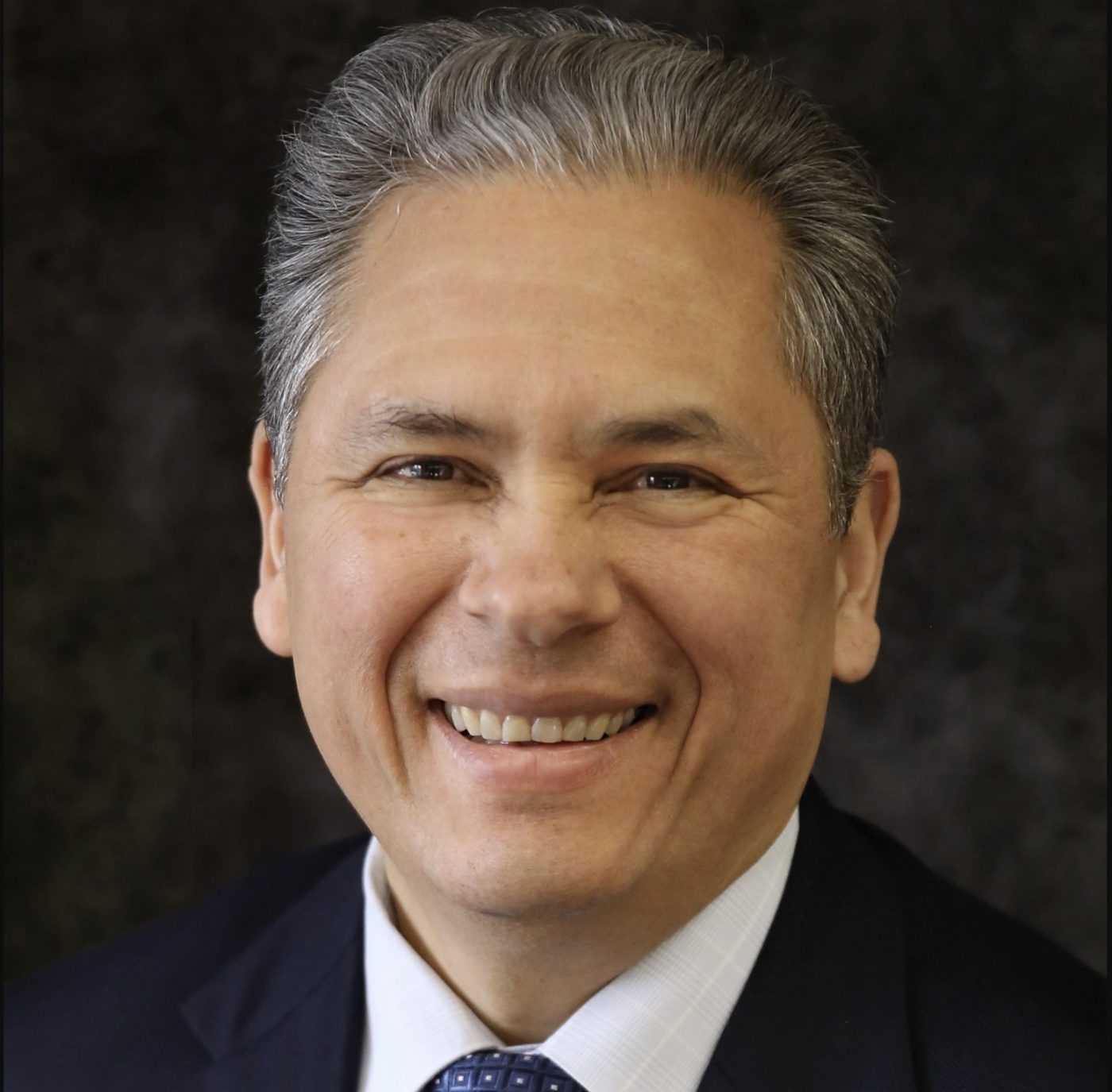
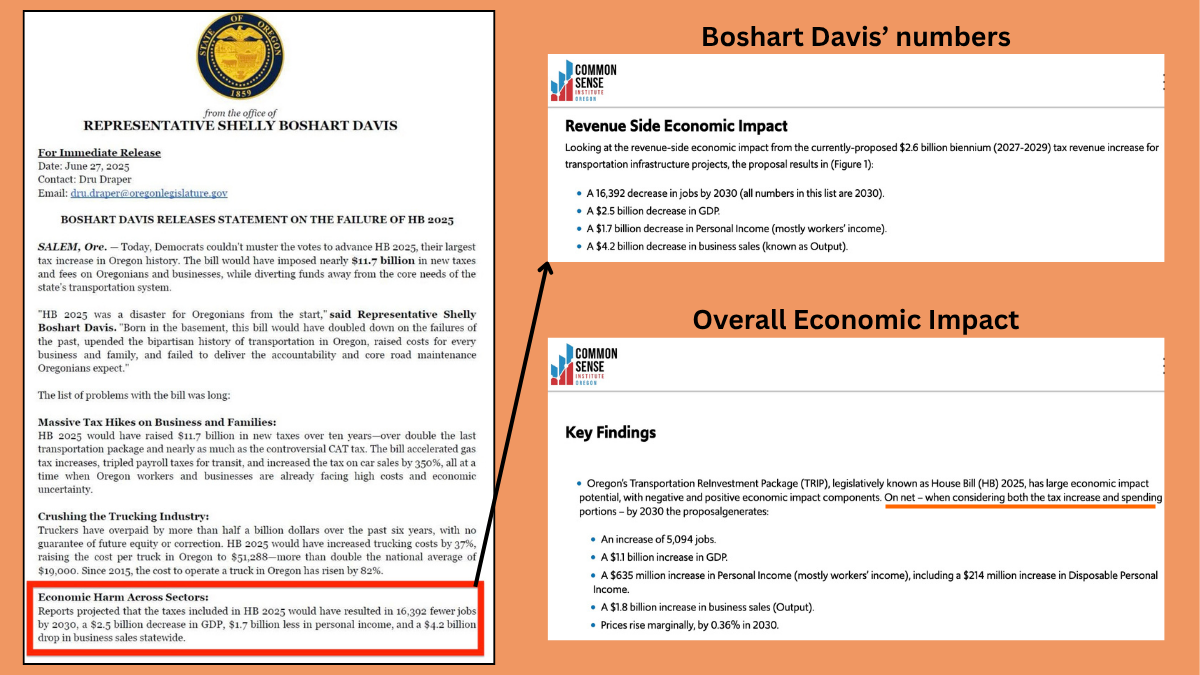

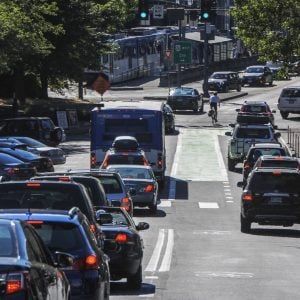
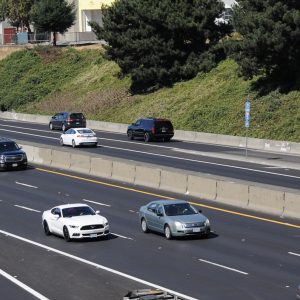

Thanks for reading.
BikePortland has served this community with independent community journalism since 2005. We rely on subscriptions from readers like you to survive. Your financial support is vital in keeping this valuable resource alive and well.
Please subscribe today to strengthen and expand our work.
One interesting thing about this story is that it demonstrates how toxic tolls are to a substantial fraction of the public and polity.
They may be a darling here, but I don’t know how they can be implemented in practice.
People want the things they use to be free. There’s a reason our national infrastructure is crumbling. Americans don’t want to pay for anything.
Our money in the form of taxes is going in large part to the military. That’s why we don’t have nice things.
It’ll either be implemented, or else people will accept higher taxes and fees throughout the state to fund regional projects in the Portland metro, or else suburbanites will have to deal with worsening congestion as the inefficient decisions they’ve been steered into by bad public policy catch up to them.
I honestly couldn’t tell you which way it’ll go. It seems like a three-way toss-up.
Since new/larger roads never improve congestion (I’m told), suburbanites will be dealing with worsening congestion regardless.
Is this not the basic argument for congestion pricing, though? Tolling may be perceived as less fair because it’s flat and not time-sensitive–and compared to the most recent American implementation of it, there are obviously fewer truly viable options to driving into the city, and less IN the city than New York, of course–but the principle of “it will cost you to drive here” is one people react negatively to, until they realize how much traffic relief it can spur, and subsequently becomes very popular, afterwards.
Maybe we should be looking at congestion pricing, instead?
I think the difference between tolling and congestion pricing is completely lost on most people. “It’s like tolling, but the price is always changing!”
Traffic dynamics in Portland are vastly different than in NYC, so I’m not sure how their experience will translate here.
I’m in favor, but then I support a lot of unpopular stuff.
On p. 56 of the bill as introduced:
https://olis.oregonlegislature.gov/liz/2025R1/Measures/ProposedAmendments/HB2025
https://oregon.public.law/statutes/ors_383.150
I’m not sure exactly what text you’re referring to, but I would ask whether it’s in boldfaced type or not.
No they are not in boldfaced type, and that someone purportedly read the article, looked at the bill, and then made the exact mistake that you described in the article and posted it once again as though it was some kind of gotcha kind of shows why we need real penalties for lawmakers willfully spreading disinformation. The lies are a lot harder to put back in the can than they are to spread.
It is not in bold. The first line I quoted was line 43, p. 56 of the Introduced version of the bill, which can be found on the top link I provided.
Ok, I think I understand… only the bold text was being voted on, and the tolling text was not in bold, so was not part of the package being voted on (even though it would still be part of the resulting statutes because it was there before).
Therefore, the claim “tolling is back” could be seen as misleading because it was already there, and these amendments didn’t touch it, whereas the claim “tolling remains” might be regarded as more accurate.
I think that’s a subtle distinction in the world of social media, and I can see why OPB might not have thought it was a big deal.
well, OPB did think it was a big deal, because they devoted several lines to it. They just didn’t think a legislator who likely was intentionally misleading people was a big enough to connect the dots to. I do think it’s a big deal. Hence my story.
Here’s what OPB said in the article you linked to:
They did not characterize the X post as a lie or even misleading. Whether these lines constitute a “big deal” or not is in the eye of the beholder.
The failure to pass a transportation bill is significant, but the “lying” detailed in this story strikes me as a bit of a yawn-fest. Politicians of all stripes mischaracterize things all the time. What Meeks did strikes me as no different than what you hear every day from basically everyone in the persuasion business.
i strongly disagree with you. What you are doing is both-sidesing the issue when one side tends to be much more guilty of this than the other. Please show me one person who supported the bill by spreading untruths and falsehoods.
And the fact that you think it’s a yawn-fest just shows how far we’ve fallen and how normalized this type of shit has become. I am trying to un-normalize it by sharing these details which I think a lot of folks don’t fully understand, but should. I think lawmakers and the media are sleeping on this stuff, meanwhile the right has perfected it and will continue to spread lies and disinformation until no policy matters and it’s only about how good you are at fear-mongering. The right only has fear and lies. Most of the left is pretty helpless and unable to counter it. That’s largely why we are in such a screwed up position nationally right now IMHO.
Is Meeks “the right” now? Not really sure why you’re dragging the boogeyman of “the right” into what is a dem issue/concern. The Dems failed through systemic incompetence due to a system where there is very little competition of ideas and so you don’t really get the best and brightest winning elections or committee seats. Also, as we saw when the committee was rearranged the leadership is overly familiar with top down instruction of how it’s appropriate to vote. You can call it the machine, proper order or whatever you want. It’s actually top down authoritarianism and should be a larger concern for you than a bunch of political groups highlighting a dem introduced message.
I’ve followed the comments and for half a day it seemed like there could be some real political introspection, but then the tide swung back and it became the Oregon republicans who want to Gilead us all or even Reagan’s fault that the bill fell apart as normal.
Somehow it’s always everyone else’s fault except the party in power.
But, keep voting for them all and I’m sure they will pick up the disgust in your sharply worded emails and they’ll change their ways./S
“it is no big deal to spread these falsehoods” said the person who spread these falsehoods in a comment earlier today…
That pretty much sums it up the folks who are lying about this stuff don’t think lying is a big deal, and that is in fact a big deal.
I misunderstood the situation earlier today. But upon review, I don’t see anything I wrote that was actually false. The language on tolling I cited was right where I said it was.
the article explained why the language was irrelevant to the bill, because it is already the law and had nothing to do with the bill, you doubled down and kept spreading the same misinformation after reading it. If you really can’t see how you are part of the problem, you are the problem.
And this is why I will never engage with Watts again. I have seen too many pyrrhic victories come from him – a complete distraction from the problem, an agendaless push towards nothing other than to win an argument on the internet. It’s exhausting and in the end, everyone loses.
Not to mention his interminable posting here, like 10 times on every subject.
His life is posting on Bikeportland.
Yes thanks. I hear this feedback too often. I’m going to hold Watts’ comments back for a while for a cooling-off period. I agree that he is commenting too much and I find his style to be very frustrating myself. And that’s saying a lot because I have a very high tolerance for folks on here.
Nothing personal Watts, I just need to keep the entire community in mind when making moderation decisions.
Sure, I get it. There are people here who are interested in engaging on the level of ideas, like blumdrew, and those who can only respond with insults and bile. For whatever reason, I am like catnip for them. I should try harder to avoid those people.
I think the word you’re looking for rather than “un-normalize” is “stigmatize”. You could also use “pillory” to great effect.
Read the rest of that section 78.
It starts: “ORS 367.095 is amended to read: …”
That law currently reads:
“The amounts described in subsection (1) of this section shall be distributed in the following order and for the following purposes… The implementation of the toll program established under ORS 383.150 (Toll program).”
Does any know what Meek’s original issue with the bill was (IE why he wouldn’t vote it out of committtee)?
To my mind, far bigger issues with this situation than the usual misinformation that is so prevalent in politics is the way this was handled.
Who thought it was a good idea to drop this so close to end of session? Who among the democrats was responsible for getting everyone onboard? (they failed) And if Senator Meek was so against it as to not vote it out of committee, who though starting a war with him by removing him from the committee was a good idea? And of course, why weren’t they messaging to counter the misinformation.
They simply failed at basic politics.
Yes I do. This one post is not a reflection of everything I know nor everything I will post about this situation.
Meek was initially frustrated by the pace of the bill and the process. Dem leadership screwed up by wasting time trying to negotiate with Republicans and so Meek (and others) starting getting mad that they didn’t have enough time to process the information. Of course he was against other aspects of it to to begin with – since he represents an extremely purple district and won his last election in 2022 by a mere 500 votes. So the big tax number was difficult for him too. Once Wagner removed him from the committee, I’m sure the tolling thing came from his sense of getting revenge and a determination to just burn the whole thing down.
That sounds likely to me too. Which brings me back around to – they needed him for the supermajority, did they really not stop and think about what they were doing when they yanked him? Did they really think they had a republican to carry the vote for them?
There’s a small part of me that doesn’t actaully blame Meek for wanting to burn it down – He was treated with colossal disrespect by the leadership of his party. Maybe he a tosser and deserved it, but that action is ultimately what led us here.
On the misinformation front (with regards to Meek, not the republicans) I’m minded of the adage “Don’t attribute to malice that which can be more easily explained by stupidity”
This actually reinforces that suspicion for me:
Having several people in my family who have worked with out legislators for decades, I will never be surprised at utter stupidity. Not quite of the level of trying to redefine Pi as 3.2, but close (Indiana Pi Bill, 1987)
Yeah, it was pretty clear the Democrats were in big trouble when two(!) Democratic JCT members suggested they’d be no votes. Wagner may have been grasping at straws by booting the dissenters from the committee, but the bill was a dead man walking as soon as Gorsek and Meek voiced their dissent.
Agreed on many levels. Booting Meek was a colossal mistake unless they were SURE to have an R lined up (likely bought off with some goodies in the bonding bill). Either Wagner did and that R flipped back or Wagner didn’t and he should never smell a leadership position again.
For my money, waiting until the very end of session was the original sin, especially after icing everyone out of the process for months. Zero margin for error and, sure enough, it bit D’s in the ass. I fully blame D’s for this failure. Sure, the R’s were no help, but what did D’s expect?
I was quite disheartened seeing the disinformation spread at such a contentious and fragile time for HB2025. I am also still surprised that no one is talking about Boshart-Davis’s conflict of interest with the transportation bills. She owns a trucking company and has a financial interest in increased gas fees, registration, etc.
Wait. Which party had the supermajority? Oh.
Now tell me which state has the asinine constitutional majority to raise revenue requirement. The kind of constitutional majority rule that takes your legislative supermajority into a razor thin governing coalition. Oh.
Sounds like a feature not a bug.
If you’re into dysfunction and minorities dictating to majorities what policies they can implement, sure, I guess I could see how one might think it’s a feature. Certainly a bunch of Oregonians in 1996 thought that way. To me, it just seems like a good way to undermine democratic government.
Weird how one of Portland’s premier misinformation outlets is suddenly concerned about…. misinformation. More than a little ironic
Hi John, I wonder if you can flesh out that allegation a bit? What’s an example of a time when BikePortland spread misinformation? I ask because I don’t ever do that type of thing here. And if I’ve ever shared inaccurate information, I will always issue a correction and/or edits.
Also, to be clear, I’m talking about disinformation in my story. There’s a difference between “mis” and “dis”. Misinformation is spreading inaccurate info on accident. Disinformation is when you are doing it more intentionally with an intent to influence narratives and/or support your beliefs.
Maus, how the hell do you take yourself seriously as a founder of what purports to be a journalistic outlet while simultaneously publishing such bad copy? I’m not trolling, my question here is real. You’ve got a misspelled word in your opening sentence! Your third sentence would have done better as two sentences, and as it stands, the syntax is just abominable. In fact, your syntax is frequently deeply unfortunate in the same or similar fashion. Take the following sentence as an example:
“This time it was from Rep. Boshart Davis, a leader in the Republican party and key voice against HB 2025 who’s also vice-chair Joint Committee on Transportation Reinvestment.”
When read, this doesn’t flow well. It trips all over itself and has the effect of confusing a reader to the point where they have to re-read it several times to have the information stick. This is commonly referred to as “poor writing”. It might better be written as follows:
“This time, opposition via misinformation came from Rep. Boshart Davis (R). Davis, a leader in the Oregon Republican party and vice-chair for the Joint Committee on Transportation Reinvestment, has emerged as a key voice against HB 2025.”
Look, I’m actually opposed to pretty much everything you advocate for, but I’d at least like to be able to make it all the way through an argument for your position without feeling like my brain is pudding at the end after I’ve beaten it into a pulp through reading bad journalism. I’d be more than happy to be your head copyeditor if you’ve got paid work available, hourly or 1099, and have a portfolio of work to submit for your consideration to back up my offer, assuming the sentence I fixed for free isn’t good enough to convince you. After posting this, you now have my email. The choice is yours, but just know that you won’t convince anyone who doesn’t already agree with you unless you can craft your argument well, and honestly, in my professional opinion, you personally don’t really have that skill set locked down. Just give it a thought or two. You know where I’ll be if you’d like to reach me.
Thanks for the help. I work alone with an editor or any proofreaders and I process a lot of information — especially when there’s a big, complex issue going on like this statewide bill. I do my best and always appreciate when folks like you point out errors and ways I can do better. So thanks! I can’t believe I misspelled ideological in the first sentence. How embarrassing!
Interesting how you try to make this bill sound so logical. No dude. Tolls or no tolls…this was not a good bill. This was a whole lot of extra taxes and more fees on people who don’t want it. I don’t want it. I don’t want them spending any more money. I want them to go find the money they already lost and be accountable to the budget they already have. Stop trying to make people feel guilty for not wanting to pay more taxes. This was never about tolls.
Tolling is not new to HB 2025, it’s been there since HB 2017! That means tolling is not back, TOLLING IS STILL HERE! Tolling, which is essentially already approved, looks like and easy lever for ODOT and PBOT to start using sooner as opposed to later while our legislators figure out how to get some strategic cost-effective transportation funding in place, and direct that funding to a more efficient transparent and audited ODOT.
Remember that the toll collection overhead is 86% here on I-205, meaning only $1 of every $8 you pay actually goes to the roads.
$14B Transportation bill… Enough of this trying to trust the Salem circus to get this solved.
IP-31, the grassroots citizen-driven VOTE BEFORE TOLLS initiative is in play and gives the citizens the right to vote – forcing ODOT and Salem transparency. Go to VoteBeforeTolls.org to protect your rights and your wallet – sign the initiative petition now!
Of course Tolling is back…just like of course 11.8 million Americans will not lose their health insurance by 2034 under Trump’s bill.